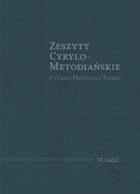ЛИНГВОКУЛТУРОЛОГИЧНА
ИНТЕРПРЕТАЦИЯ НА ТУРЦИЗМИТЕ
В ХРИСТИЯНСКИ РЕЛИГИОЗНИ ТЕКСТОВЕ
LINGUO-CULTURAL INTERPRETATION OF TURCISMS IN CHRISTIAN RELIGIOUS
TEXTS
Author(s): Mariyana Tsibranska-KostovaSubject(s): History, Language and Literature Studies, Cultural history, Applied Linguistics, Sociolinguistics
Published by: Wydawnictwo Naukowe Uniwersytetu Marii Curie-Sklodowskiej
Keywords: Synaxary Life; St. George the New of Sofia; Bulgarian Language during the Ottoman period; 18th century hagiography
Summary/Abstract: One of the most important tendencies in the lexis of the Bulgarian language during the Ottoman period is the interference of foreign lexis and in particular the so-called turcisms or osmanisms. The article examines the connotative function of selected Turkish borrowings in the Synaxary Life of St. George the New of Sofia. One of its copies from the town of Elena, of the early 18th century, is a deliberate adaptation of an unknown writer who introduced Turkish terms for denoting specific realities in order to achieve a consciously sought authenticity and plausibility of the story, and to restore the emotional perception of George’s martyrdom two centuries after the event. Although moving away from the original, the Elena copy contributes to the deepening of the message of the literary work thus making it more accessible to the common reader through the use of meaningful details.
Journal: Zeszyty Cyrylo-Metodiańskie
- Issue Year: 10/2021
- Issue No: 1
- Page Range: 7-19
- Page Count: 13
- Language: Bulgarian

